编者按
时值建党百年,为实现党建联动区域化、促进党史教育机制化,上海外国语大学与上海龙华烈士陵园举办签约共建仪式,开展建党百年专题活动,引导广大青年在学思践悟中传颂先辈故事、坚定理想信念。上外英院龙陵青年志愿服务队从译介角度进行实践,讲演中国共产党人的革命故事,积极推广文化译介新理念,助力红色文化“走出去”。
朗读者:2019级本科生 戴润知
这是1936年5月1日出版的《生活教育》杂志第3卷第5期,其中登载有陆维特的狱中作品——《流浪儿合奏曲》。封面钤盖3枚印章,即“华南女大学图书馆”(蓝色椭圆形印章)、“上海市陶行知教育思想研究会”(红色圆形印章)、“请勿携出室外”(蓝色长方形印章)。封底另有两枚模糊的印章。页数从163页至198 页。陆维特的《流浪儿合奏曲》登载在第177页至181页。
This is the magazine Life Education (Volume 3, Issue 5, May 1, 1936), in which Lu Weite's prison work, "Wandering Children's Ensemble", was published. There are three seals on the cover, namely, "Southern China Female University Library" (blue oval seal), "Shanghai Tao Xingzhi Educational Thought Research Association" (red round seal), and "Please Don’t Take Out" (blue rectangular seal). Two other blurred seals can be found on the back cover. The number of pages ranges from 163 to 198. Lu Weite's "Wandering Children's Ensemble" appears on pages 177 to 181.
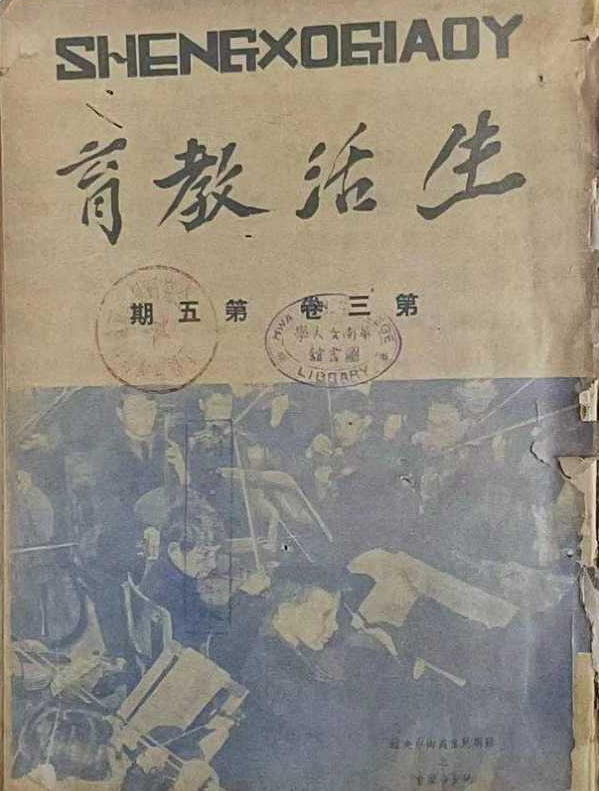
图为登载陆维特《流浪儿合奏曲》的《生活教育》杂志
(24.5 cm x 18.4 cm)
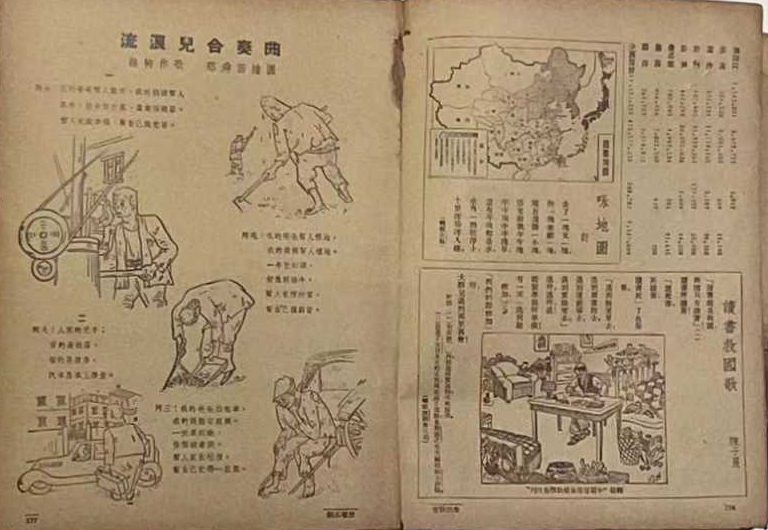
图为陆维特的狱中作品《流浪儿合奏曲》
陆维特(1909—1991),原名赖成瑚,福建长汀人。1928年考入南京哓庄师范。1929年9月加入中国共产党。在革命斗争中曾两次被捕入狱。1937年国共第二次合作时获释。出狱后在上海陶行知领导的生活教育社工作,编辑《战时教育》半月刊。1939年到重庆陶行知创办的育才学校工作。1941年“皖南事变”后,调新四军政治部工作,在苏北解放区任苏皖教育学院教育长、盐埠师范校长、华中建设大学代教务长等职务。1948年赴苏联考察学习。1950年回到福建,先后在福建人民革命大学、厦门大学、福建省科协担任党委书记、校长、主席职务。曾任第六届全国政协委员、第五届福建人大常委会委员、中国陶行知研究会副会长。
Lu Weite (1909-1991), formerly known as Lai Chenghu, was a native of Changting, Fujian Province. He entered NanJing XiaoZhuang Normal University in 1928, and joined the Chinese Communist Party in September 1929. He was arrested and imprisoned twice amid revolutionary struggles, and was released in 1937 during the second cooperation between the KMT and CPC. After his release from prison, he worked for the Life Education Association in Shanghai under the leadership of Tao Xingzhi and edited the bimonthly publication War Time Education. In 1939, he went to work at the Yucai School in Chongqing, founded by Tao Xingzhi. After the "Southern Anhui Incident" in 1941, he was transferred to the Political Department of the New Fourth Army and served as the Director of Education of the Southern Anhui Education College, the Principal of Yanbu Normal School and the Acting Dean of Faculty of the Central China Construction University in the liberated areas in northern Jiangsu. In 1948, he went to the Soviet Union for research and study, and returned to Fujian in 1950, where he served as Secretary of the Party Committee, President and Chairman of Fujian People's Revolutionary University, Xiamen University and the Fujian Provincial Science Association. He was also a member of the Sixth National Committee of the Chinese People's Political Consultative Conference, a member of the Standing Committee of the Fifth Fujian People's Congress, and Vice President of the China Tao Xingzhi Research Association.

图为陆维特像
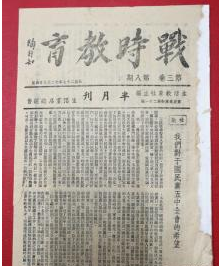
图为《战时教育》半月刊
20世纪30年代,陆维特在上海从事党的秘密工作,担任中共上海市委法南区支部书记、区委发行部长,组织并参与进步爱国学生运动,还参加了左翼剧联活动。这一时期,他曾两度被捕。第二次被捕是1931年4月,这一次他经历了长达 6年严酷的囚徒生活。在上海龙华监狱,他机智沉着,坚持斗争,表现了共产党人的坚强意志与浩然正气。那时,他亲历了一场“爱国有罪”的运动,目睹了爱国志士所遭受的酷刑与屈辱,这些残暴屠杀的场景以及狱墙上的励志诗篇,都深深震撼了陆维特的心灵。在狱中,他追思、遥想,并深情地谱写了《流浪儿合奏曲》这首长诗:
In the 1930s, Lu Weite was engaged in secret Party work in Shanghai, serving as Secretary of the Fanan District of the Shanghai Municipal Committee of the Communist Party of China and Minister of distribution of the district committee, organizing and participating in the progressive patriotic student movement, and also taking part in the activities of the Left Wing Drama League. During this period, he was arrested twice. His second arrest occurred in April 1931, and this time he experienced six years of harsh imprisonment. In Longhua Prison in Shanghai, he demonstrated the strong will and righteousness of a Communist by persevering in the struggle with wisdom and composure. At that time, he witnessed a campaign of "patriotic guilt" and saw the torture and humiliation suffered by patriotic aspirants. While in prison, he reflected on and thought about the scenes, and wrote the long poem "The Wandering Children's Ensemble" with strong emotion:
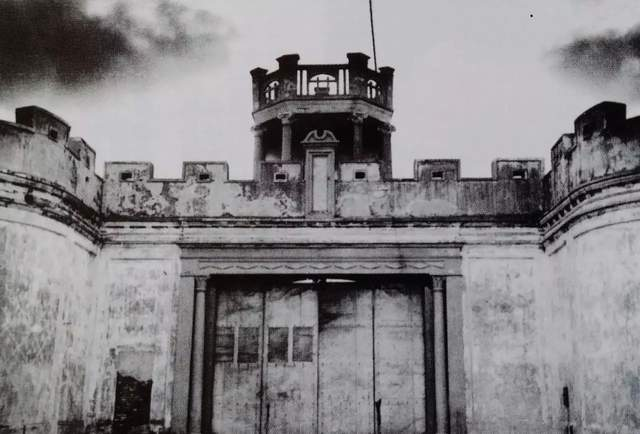
图为上海龙华监狱旧址
陆维特 / 《流浪儿合奏曲》
一
阿大:
我的爸爸帮人织布,我的妈妈帮人织布。
拼命出力气,像架活机器。
帮人家织幸福,帮自己织愁苦。
阿毛:
我的爸爸帮人种地,我的妈妈帮人种地。
—年忙到头,好像两头牛。
帮人家种财富,帮自己种穷苦。
二
阿大:
人家的儿子:
穿的是绫罗,住的是楼房,汽车马车上学堂。
阿三:
我的爸爸拉包车,我的妈妈当娘姨。
一天系到晚,像个破畚箕。
帮人家出垃圾,帮自己忙得一肚气。
阿毛:
人家的儿子:
吃的是大菜,玩的是跳舞,髙兴的时候到外洋。
阿三:
人家的儿子:
西装簇簇新,胸挺脸儿胖,十十足小洋奴。
三
阿大:
织布的儿子有什么?
有的是愁苦;飞絮伤我肺,机器吃我肉,拿马温像只活老虎。
我小小的年纪啊!
已尝尽了作人的痛苦。
阿毛:
种地的儿子有什么?
有的是穷苦;饥饿当饭吃,寒冷当衣服,牛栏狗窠旁边住。
我小小的年纪啊!
已作了爸爸的候补。
阿三:
苦力的儿子有什么?
有的是闷气;爸爸挨人骂,拿我来出气,满身龌龊没人洗。
我小小的年纪啊!
已没有一个人来爱惜。
阿毛:
家乡年年开内战,家乡年年闹灾荒,到底穷人遭灾殃。
可恨长江大水最无情,把我全家冲散没音信。
四
阿大:
世界到处闹恐慌,只有一处不算上。
外国工厂合理化,本国工厂多打烊。
失业把我全家活埋葬。
阿三:
上海穷人十分多,可惜没有全合作。
爸爸生意被抢夺,只好靠我妈妈来过活,
把我全家弄得更难过。
五
阿三:
从此我更挨冻,从此我和死结合,从此我更堕落!( ?)
阿大:
从此我更饥饿,从此我和死结合,从此我更堕落!( ?)
阿毛:
从此我更漂泊,从此我和死结合,从此我更堕落!( ?)
阿大:
我拜了一个干软扒的师父,他教我怎样怎样做。
只吃他的饭,东西要交窠。
稍一不听话,就要行家法,弄得我半死又半活。
阿毛:
我认了一个干硬扒的爷叔,他教我怎样怎样做。
只吃他的饭,东西要交窠。
稍一不听话,小就一顿皮浪头,大就一场大生活。
阿三:
我拜了一位开桃园的师父,他教我怎样怎样做。
只吃他的饭,东西要交窠。
就是出师日,年节和生日。送礼物也是不敢薄。
三人合唱:
从此警察认识了我们,从此牢监也就成了家,
苦头吃得多,事情越明了。
要出头大家手拉手,除掉恶根子,涌出新自由。
那时大家种财富,那时大家种幸福,那时大家都服务。
这首诗当时被秘密传送到《生活教育》杂志,陶行知先生以“维特”署名发表。直到1937年第二次国共合作,陆维特才被提前释放。他出狱后改名为陆维特,以此纪念他的6年铁窗生活,也是对陶行知先生给予笔名的敬重。为了那段不能忘却的狱中斗争经历,他后来还特地撰写了一部报告文学——《三千六百日》。
The poem was secretly transmitted to the magazine Life Education and published by Mr. Tao Xingzhi under the name of "Werther". It was not until 1937, the second cooperation between the KMT and CPC, that Lu Weite was released ahead of time. After his release, he changed his name to Lu Weite to commemorate his six years of life behind bars and to honor Mr. Tao Xingzhi for giving him his pen name. For that unforgettable experience of struggle in prison, he later wrote a special report literature--Three Thousand and Six Hundred Days.
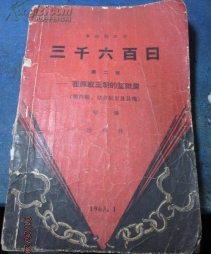
图为陆维特《三千六百日》
1990年陆维特在上海中山医院治病期间,上海市龙华烈士陵园筹建办工作人员前去探望,当时他谈及在狱中曾创作《流浪儿合奏曲》,并发表在《生活教育》杂志上之事。目前,龙华烈士纪念馆馆藏的这本《生活教育》是上海陶行知研究会的负责人吕长春的藏书,他于1991年6月将此书捐赠。
In 1990, when Lu Weite was in Shanghai Zhongshan Hospital for medical treatment, the staff of the Shanghai Longhua Martyrs' Cemetery Planning Office paid a visit to him. During that visit he talked about having composed the "Wandering Children's Ensemble" in prison and published it in Life Education. At present, this copy of magazine is preserved among the collections at Longhua Martyrs Memorial Hall. The magazine was once owned by Lv Changchun, the head of Tao Xingzhi Research Association in Shanghai, who donated it in June 1991.
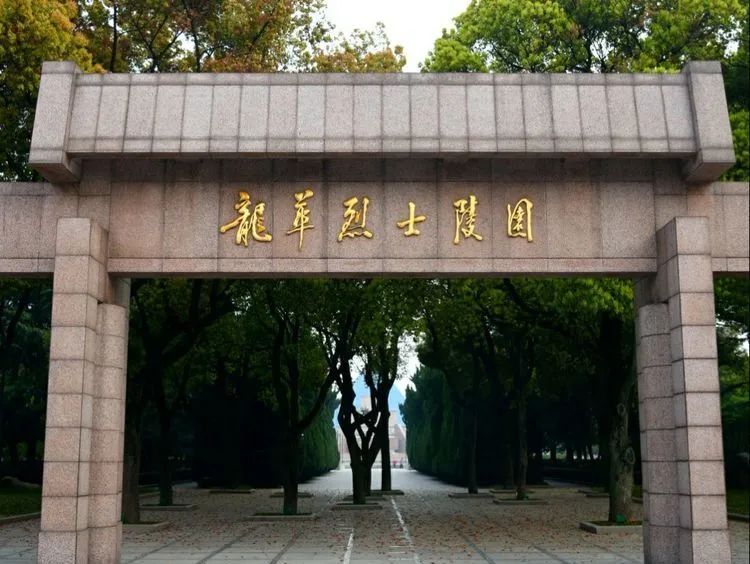
图为上海市龙华烈士陵园
我要评论 (网友评论仅供其表达个人看法,并不表明本站同意其观点或证实其描述)
全部评论 ( 条)